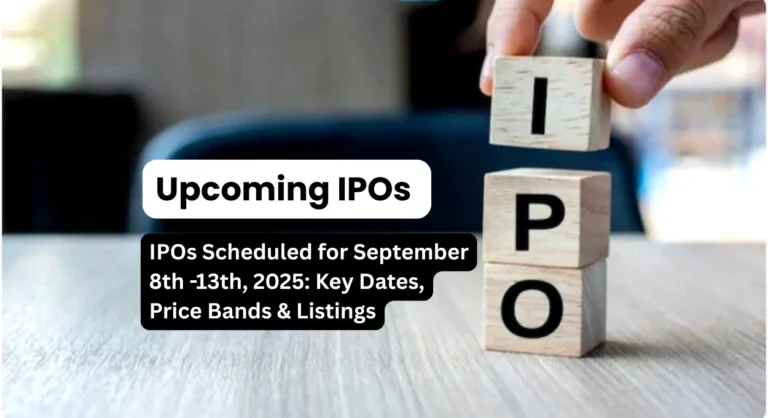Travel Food Services IPO: A Muted Debut on the Stock Market
The highly anticipated debut of Travel Food Services (TFS) on the Indian stock exchanges on July 14, 2025, proved to be a rather subdued affair. As a leading operator of airport-based restaurants and lounges, Travel Food Services IPO was closely watched. However, its listing day performance was characterized by a modest premium that quickly dissipated. This post dives into the specifics of why TFS experienced a “muted debut” and what it means for the company and investors.
The Big Day Arrives: Key Listing Highlights for TFS
July 14, 2025, marked the official entry of Travel Food Services onto the Indian stock exchanges, both the Bombay Stock Exchange (BSE) and the National Stock Exchange (NSE). Here’s a snapshot of the crucial numbers from its listing day:
- Listing Date: July 14, 2025
- Issue Price: ₹1,100 per share (This was the price at which shares were offered to investors during the IPO)
- Listing Price:
- BSE: ₹1,126.20 (A modest premium of 2.38% over the issue price)
- NSE: ₹1,125 (A premium of 2.27% over the issue price)
- Market Capitalization on Listing: ₹14,829.74 crore (This represents the total value of all TFS shares in the market on day one)
- IPO Size: ₹2,000 crore (Notably, the entire IPO was an Offer For Sale, meaning existing shareholders sold their shares, and the company itself did not raise any fresh capital for its operations or expansion)
These initial figures set the stage for what would be a day of cautious trading, reflecting the underlying market sentiment and investor expectations.
Also Read :- Meta Infotech’s Explosive Debut: A Deep Dive into Its Stellar Listing Day Performance
The Price Rollercoaster: TFS Share Price Movement on Listing Day
While the initial listing premium offered a glimmer of hope, the TFS share price debut experienced a notable shift throughout the trading day. After opening modestly higher, the stock faced selling pressure, indicating that not all investors were convinced of its immediate upside potential at the listing valuation.
Let’s delve into the intraday price movements on both exchanges:
BSE Listing Day Performance
| Exchange | Issue Price (₹) | Listing Price (₹) | % Premium (at Open) | Intraday High (₹) | Intraday Low (₹) | Closing Price (₹) | Day’s Movement (from peak) |
| BSE | 1,100 | 1,126.20 | 2.38% | 1,128.90 | ~1,077 | ~1,080.50 | Fell ~5% from peak |
NSE Listing Day Performance
| Exchange | Issue Price (₹) | Listing Price (₹) | % Premium (at Open) | Intraday High (₹) | Intraday Low (₹) | Closing Price (₹) | Day’s Movement (from open) |
| NSE | 1,100 | 1,125 | 2.27% | 1066 | ~1,077 | ~1,080.50 | Fell ~3.96% from open |
As the tables illustrate, after opening marginally above its issue price, the TFS stock quickly slipped below the ₹1,100 mark during the trading session. By the close of the day, it settled at approximately ₹1,080.50 on both exchanges, representing a decline of about 5% from its intraday peak on BSE and nearly 4% from its opening price on NSE. This downward movement clearly reflected a cautious investor sentiment that prevailed throughout the day. The initial premium, while present, wasn’t sustained, suggesting that while there was some interest, it wasn’t strong enough to absorb selling pressure at higher levels.
Also Read :- Crizac Limited’s Grand Entrance: A Deep Dive into Its Stellar Listing Day Performance
Who Bought What? Investor Response & IPO Subscription Details
The success of an IPO is often gauged by its subscription levels, which indicate how much demand there was for the shares offered. The TFS IPO subscription data tells an interesting story about investor confidence across different categories.
The overall subscription for the Travel Food Services IPO ranged between 2.88 and 3.03 times. This is considered a moderate response, neither overwhelming nor underwhelming. However, a deeper look into the investor categories reveals a varied picture:
- Qualified Institutional Buyers (QIB): This segment, comprising large institutions like mutual funds, foreign institutional investors, and insurance companies, showed robust demand, subscribing between 7.70 and 8.10 times. This strong interest from institutional players is often seen as a sign of confidence in the company’s long-term prospects. QIBs typically conduct extensive due diligence and have a longer investment horizon.
- Non-Institutional Investors (NII): This category includes high-net-worth individuals (HNIs) and corporates. Their participation was more subdued, with subscriptions ranging from 1.58 to 1.67 times. This indicates a cautious approach from HNIs, who often look for quick listing gains.
- Retail Investors: The retail segment, made up of individual investors, showed the most muted response, with subscriptions only between 0.69 and 0.73 times. This means that the retail portion of the IPO was not fully subscribed, suggesting a lack of widespread enthusiasm among small investors.
The modest Grey Market Premium (GMP) leading up to the listing also foreshadowed this cautious debut. GMP, an unofficial indicator of listing expectations, hovered around ₹20–₹35 in the days before listing. This translated to an estimated 1.8–3% premium over the issue price, which was largely in line with the actual listing premium. The fact that the entire IPO was an Offer For Sale (OFS), meaning no fresh capital was infused into the company for its growth, might have also influenced investor sentiment, particularly among retail participants who often prefer IPOs that bring in new funds for business expansion.
Also Read :- Ace Alpha Tech Listing Day Performance: A Strong Debut on BSE SME
What the Experts Said: Analysis & Commentary on TFS
Following the TFS IPO listing, market analysts and financial experts weighed in, offering their insights into the company’s debut and its future outlook. Their commentary largely aligned with the subdued performance observed.
Market Sentiment: “Muted” or “Measured” Debut
Analysts widely described the debut as “muted” or “measured,” which was consistent with the modest grey market expectations. The primary reasons cited for this tepid response included:
- Valuation Concerns: Despite TFS’s strong market position, many analysts felt that the IPO was “richly valued.” The company’s Price-to-Earnings (P/E) ratio stood at 48.6x, which was considered high by some, leading to a cautious approach from investors who might have found better value elsewhere in the market.
- Secondary Nature of Offering: As mentioned earlier, the entire IPO was an OFS, meaning the proceeds went to existing shareholders rather than into the company’s coffers. This can sometimes deter investors who prefer to see fresh capital being raised for the company’s growth initiatives.
Company Position: A Strong Market Leader
Despite the subdued listing, experts acknowledged TFS’s strong fundamentals and dominant market position. The company holds a leading market share in key segments within Indian airports:
- Airport QSRs: TFS commands a significant 26% market share in the quick service restaurant segment at airports. This indicates a strong presence in a high-growth area.
- Airport Lounges: Even more impressively, TFS holds a dominant 45% market share in airport lounges across India. This segment is known for its higher margins and premium offerings.
TFS’s extensive portfolio of 117 brands and 397 outlets spread across major Indian airports further solidifies its leadership position. This wide network and diverse brand offerings provide a strong foundation for future growth as air travel continues to expand in India.
Financials: Robust Growth, but Valuation Questioned
From a financial standpoint, TFS had reported robust growth leading up to the IPO. In FY25, the company demonstrated strong performance, including:
- EBITDA Margins: A healthy 40%, indicating efficient operational management and profitability.
- Return on Equity (ROE): An impressive 35.47%, showcasing the company’s ability to generate profits from shareholders’ investments.
However, as noted by experts, these strong financials were already factored into what was perceived as a high IPO valuation. The market’s reaction suggests that while the company’s past performance was commendable, the future growth potential at the offered price might not have presented a compelling enough discount for broader investor participation, especially from the retail segment.
Also Read :- HDB Financial Services Limited IPO: A Comprehensive Analysis of Its Strong Stock Market Debut
Conclusion: A Cautious but Stable Landing for TFS
Travel Food Services’ IPO listing on July 14, 2025, can be characterized by a modest premium at opening, followed by a subsequent slip below the issue price during the trading day. This performance was largely in line with the expectations set by the Grey Market Premium, indicating a cautious yet stable outlook for the company in the Indian market.
While institutional investors demonstrated strong interest, their enthusiasm was not fully mirrored by retail participants, who showed limited engagement. The underlying reasons for this “muted” debut, as highlighted by market analysts, primarily revolved around valuation concerns and the Offer For Sale structure, which meant no fresh capital infusion into the company.
Despite the subdued listing day performance, TFS remains a company with strong fundamentals, commanding a leading market share in the lucrative airport F&B and lounge segments in India. Its extensive operational network and robust financial metrics position it well for long-term growth as the travel sector continues its recovery and expansion. For investors, the listing day provided a clear signal: while the company’s prospects are solid, the initial valuation presented a less aggressive entry point than some might have hoped for. The journey of TFS on the public markets has just begun, and its future performance will undoubtedly be watched closely by industry observers and investors alike.
FAQs (Frequently Asked Quentions)
- What was the issue price of the Travel Food Services IPO? The issue price for the Travel Food Services IPO was ₹1,100 per share.
- How did Travel Food Services’ shares perform on listing day? TFS shares listed at a modest premium (2.38% on BSE, 2.27% on NSE) but slipped below the issue price during the day, closing at approximately ₹1,080.50.
- What was the overall subscription level for the TFS IPO? The overall subscription for the Travel Food Services IPO was moderate, ranging between 2.88 and 3.03 times.
- Which investor category showed the most interest in the TFS IPO? Qualified Institutional Buyers (QIBs) showed the strongest interest, subscribing between 7.70 and 8.10 times, while retail participation was muted.
- Why was the TFS IPO debut considered “muted” by experts? Experts attributed the muted debut to valuation concerns (P/E of 48.6x) and the fact that the entire IPO was an Offer For Sale (OFS), meaning no fresh capital was raised by the company.
- What is Travel Food Services’ market position in India? Travel Food Services holds a leading market share in airport QSRs (26%) and lounges (45%) in India, with a wide network of brands and outlets across major airports.







